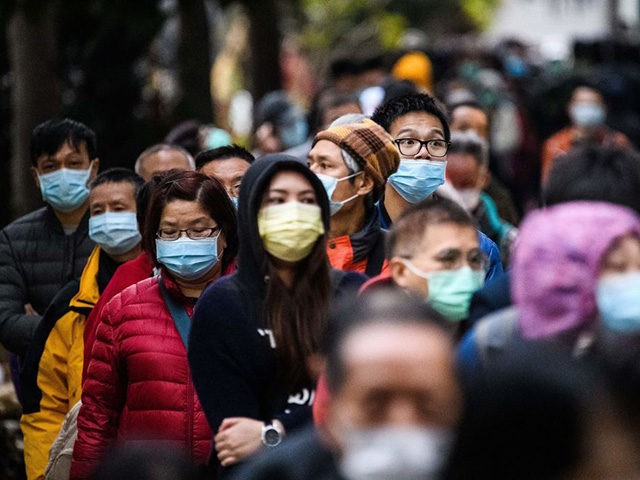Tens of thousands of people visited a provincial park in southeast China over the weekend, forcing it to close after reaching capacity. The outpouring of visitors comes as Wuhan officials have warned people to stay home amid reports of new coronavirus infections in China.
Huangshan, or Yellow Mountains, in Anhui province attracted 20,000 people on Saturday, forcing it to close on Sunday after reaching its capacity in one day. Visitors had their body temperatures checked before entering the park. They were also asked to demonstrate their health status on an app and wear a sanitary mask.
Photos of the site over the weekend showed throngs of people vying for trail access. In one photo, police are shown attempting to hold back visitors to the mountain range.
Most Chinese citizens have been under a strict quarantine, enforced by the state for months, in an effort to slow the spread of the Wuhan coronavirus. Their eagerness to swarm an open-air site by the masses the moment permission was granted demonstrates the degree to which the Chinese people have been locked down.
Anhui province shares its western border with the central Hubei province. Wuhan – the epicenter of the Wuhan coronavirus outbreak in China late last year – is the capital of Hubei province.
Starting from Saturday, the Anhui provincial government had been offering free entry to the mountain range, along with 28 other sites, to promote visitor numbers and boost tourism. However, on Sunday, Huangshan authorities said the park would have to close because the number of visitors had reached its limit. Park authorities urged people to visit other sites or return to the mountain range another time.
The mixed message from officials demonstrates China’s difficulty balancing the country’s economic and health needs amid the current Wuhan coronavirus epidemic. In its eagerness to get the Chinese economy back online, the Chinese Communist Party (CCP) risks placing the health of its citizens in jeopardy.
In Wuhan, authorities recently called for strict controls on residents’ movements to continue. In a statement released by state-run media platforms, Wuhan’s municipal health commission admonished the public for “slacking off” in its attitude to the Wuhan coronavirus. This notice has caused Wuhan residents to worry the lockdown of the capital may not be lifted on April 8 as planned.
The municipal notice said that large numbers of people had been arriving in Wuhan from elsewhere in China and that all forms of traffic had been on the rise, despite restrictions still being in place. It called on the ruling CCP neighborhood committees to continue with a closed-door policy for all residential areas, preventing all but essential entry and exit. The CCP neighborhood committees exercise direct control over the lives of people in residential compounds and housing projects.
China confirmed 30 new Wuhan coronavirus cases on Saturday, five of which were cases in southern Guangdong province. The new cases in Guangdong, an economic “powerhouse” for China and one of the worst-hit areas outside of Hubei province, serve as an excellent example of China’s current dilemma.
In February, as its number of new cases steadily dropped, Guangdong lowered its public health emergency response to the Wuhan coronavirus epidemic, designed to offer some economic relief to businesses. The decision came amid a push from Beijing at the time to get people back to work; CCP leader Xi Jinping had been urging officials to lower the emergency response level wherever possible.
“I think now is the right time [to lower the emergency response level]. This will help production to resume,” a Guangdong-based respiratory expert leading China’s Wuhan coronavirus response said at the time.
Now, two months later, the new cases emerging in Guangdong have cast doubt over the CCP’s decision to compromise public health precautions for economic progress.

COMMENTS
Please let us know if you're having issues with commenting.